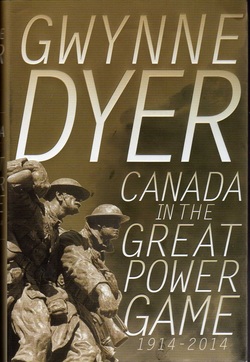
Gwynne Dyer begins this book by recalling that a combined book and CBC television project which he co-authored in 1986, The Defence of Canada, had been mysteriously cut back by both the publisher and the network, even though its authors had been paid for both a second volume and a rebroadcasting of the series. He later learned of how threatened the Canadian military had been by the project, and of the 14-year effort they had launched to propagandize against it. Whether the targets of this effort included the CBC and a book publisher is unknown to Gwynne; he concludes only that they “might” have – that is, the military “might” have been playing a small version of a much bigger and longer-running global game in which individual lives and the fates of small regions and countries were pawns easily sacrificed to the interests of a few large nation-states and their alliances.
This “great game” metaphor for relations among the powerful nation-states of the world has a substantial history and a recurrent place in the literature of political science and military history. Its origin is usually associated with the 19th-century expansion of Russia into central Asia and with British fears that their Indian empire could be invaded by Russia through Afghanistan, and also with Rudyard Kipling’s novel Kim in which it is a standard term for the spying, plotting, counterspying, and surreptitious killings through which political influence in Afghanistan is being contested. When Dyer’s book opens, the “great game” has become an established European game in which the most powerful states of the early 1900s compete in making alliances, building militaries, devising armaments, stealing territory, acquiring colonies, and securing natural resources, all the while imagining that their economic prosperity depends not on cooperation but dominance. Nineteenth-century wars, Dyer explains, had enriched the victors while leaving relatively intact the political systems and core territories of the losers – phenomena which the great powers expected to continue.
Dyer’s central argument here has two parts. The first is that by the early 1900s this “great game” concept could no longer work – the First World War would result in the collapse of the Ottoman
 RSS Feed
RSS Feed